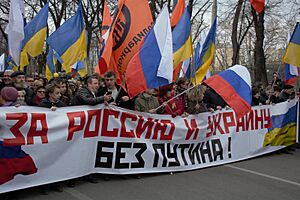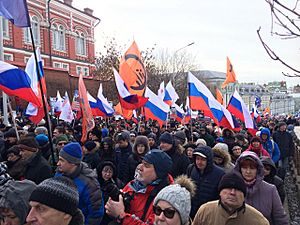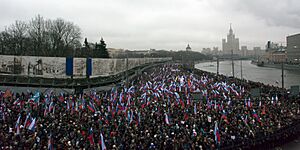Boris Nemtsov facts for kids
Quick facts for kids
Boris Nemtsov
|
|
|---|---|
|
Борис Немцов
|
|
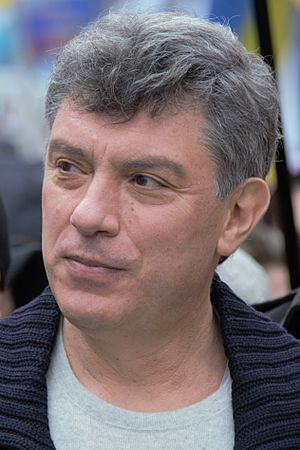
Nemtsov in March 2014
|
|
| Deputy Prime Minister of Russia | |
| In office 28 April 1998 – 28 August 1998 |
|
| President | Boris Yeltsin |
| Prime Minister | Sergey Kirienko Viktor Chernomyrdin (acting) |
| First Deputy Prime Minister of Russia | |
| In office 17 March 1997 – 28 April 1998 Serving with Anatoly Chubais
|
|
| President | Boris Yeltsin |
| Prime Minister | Viktor Chernomyrdin |
| Preceded by | Alexei Bolshakov Viktor Ilyushin Vladimir Potanin |
| Succeeded by | Sergey Kiriyenko |
| 1st Governor of Nizhny Novgorod Oblast | |
| In office 30 November 1991 – 17 March 1997 |
|
| Preceded by | Position established |
| Succeeded by | Ivan Petrovich Sklyarov |
| Personal details | |
| Born | 9 October 1959 Sochi, Russian SFSR, Soviet Union |
| Died | 27 February 2015 (aged 55) Moscow, Russia |
| Cause of death | Assassination |
| Political party | Union of Right Forces (1999–2008) Solidarnost (2008–2010) People's Freedom (2010–2012) RPR-PARNAS (2012–2015) |
| Spouse | Raisa Ahmetovna (separated) |
| Children | 4, including Zhanna |
| Awards | Medal of the Order "For Merit to the Fatherland" (second degree, 1995); Order of Prince Yaroslav the Wise (Fifth degree, 2006, Ukraine); Order of Liberty (Ukraine, posthumously); IRI Freedom Award (the US, posthumously). |
|
Other offices held
2013–2015: Member of the Russian regional parliament of Yaroslavl Oblast
2012–2015: Co-chairman of the Republican Party of Russia – People's Freedom Party 2005–2006: Free lance adviser to Ukrainian president Viktor Yushchenko 2000–2003: Leader of the Union of Right Forces parliamentary group 2000: Deputy Chairmen of the State Duma 1999–2003: Member of the State Duma from the 117th single-member district 1997–1998: Member of the Security Council 1997: Federal Minister of Fuel and Energy 1993–1997: Member of the Federation Council from Nizhny Novgorod Oblast 1991–1997: Governor of Nizhny Novgorod Oblast 1991: Member of the Council of the Republics of the Supreme Soviet of the Soviet Union 1991–1994: Plenipotentiary Representative of the President of the Russian Federation in Nizhny Novgorod Oblast 1991–1993: Member of the Supreme Soviet of Russia 1990–1993: People's Deputy of the Russian SFSR from Gorky district |
|
Boris Yefimovich Nemtsov (Russian: Бори́с Ефи́мович Немцо́в; 9 October 1959 – 27 February 2015) was a Russian physicist and a liberal politician. He was known for speaking out against Vladimir Putin. His life and work as an activist ended when he was killed in Moscow.
Earlier in his political life, Nemtsov helped bring important changes to Russia's economy after the Soviet Union ended. In the 1990s, under President Boris Yeltsin, he was the first governor of the Nizhny Novgorod Oblast (1991–1997). Later, he worked in the Russian government as the Minister of Fuel and Energy (1997) and as a Deputy Prime Minister (1997–1998). He also served on the Security Council.
In 1998, he started the Young Russia movement. He also helped create the Right Cause group and, in 1999, the Union of Right Forces, which became a political party. Nemtsov was also a member of different parts of the Russian parliament, including the Congress of People's Deputies (1990), the Federation Council (1993–1997), and the State Duma (1999–2003).
From 2000 until his death, he was a strong critic of Vladimir Putin. He believed Putin's government was becoming too strict and undemocratic. He pointed out problems like widespread corruption, especially before the Sochi Olympics. He also spoke about Russia's involvement in Ukraine. After 2008, Nemtsov wrote detailed reports showing corruption that he linked directly to President Putin. He was also a key organizer and participant in protests like the Dissenters' Marches and rallies "For Fair Elections."
Nemtsov was killed on 27 February 2015, near the Kremlin in Moscow. He was shot four times from behind. At the time, he was helping to organize a protest against Russia's military actions in Ukraine and the country's financial problems. He was also working on a report to show that Russian soldiers were fighting in eastern Ukraine, which the government denied. In the weeks before his death, he had said he feared Putin might have him killed. In 2017, five men from Chechnya were found guilty of killing Nemtsov for money. However, the person who hired them is still unknown.
Contents
Early Life and Education
Growing Up in Russia
Boris Yefimovich Nemtsov was born in Sochi in 1959. His parents were Yefim Davidovich Nemtsov and Dina Yakovlevna Nemtsova. His mother was a doctor and was Jewish.
Nemtsov grew up in Gorky, which is now called Nizhny Novgorod. His parents separated when he was five years old. In his life story, Nemtsov wrote that his grandmother, who was Russian Orthodox, had him baptized as a baby. He later became a practicing Orthodox Christian, finding out about his baptism many years later.
Studies in Physics
From 1976 to 1981, Nemtsov studied physics at N. I. Lobachevsky State University in Gorky. He earned his degree in 1981.
In 1985, at age 25, he earned his PhD in Physics and Mathematics from the same university. Until 1990, he worked as a researcher at the Radiophysical Research Institute. He wrote over 60 scientific papers about quantum physics, thermodynamics, and acoustics. He even suggested a new idea for an acoustic laser and a new design for space antennas.
Early Political Career (1986–2004)
Starting in Activism
After the Chernobyl disaster in 1986, Nemtsov organized protests in his hometown. These protests successfully stopped the building of a nuclear power plant in the area. This showed his early interest in public safety and activism.
In 1989, Nemtsov ran for the Soviet Congress of People's Deputies. He wanted reforms like having many political parties and private businesses, which were very new ideas at the time. He did not win that election.
Joining the Parliament
In Russia's first free elections in 1990, he ran for the Supreme Soviet of the Russian Republic. He represented Gorky, which was later renamed Nizhny Novgorod. Nemtsov won, becoming the only candidate who was not from the Communist Party. He beat twelve other candidates. In Parliament, he joined groups that wanted reforms and changes.
Nemtsov worked on laws about farming and making foreign trade more open. He met Boris Yeltsin, who was impressed by his work. During a difficult time in October 1991, when opponents attacked the government, Nemtsov strongly supported President Yeltsin. After these events, Yeltsin made Nemtsov his special representative in his home region of Nizhny Novgorod.
Governor of Nizhny Novgorod
In November 1991, Yeltsin appointed Nemtsov as the Governor of the Nizhny Novgorod region. He was re-elected by the people in December 1995. During his time as governor, he started many free-market reforms. These changes were called the "Laboratory of Reform" for Nizhny Novgorod and helped the region's economy grow a lot.
Nemtsov's reforms were even praised by former British Prime Minister Margaret Thatcher. She visited Nizhny Novgorod in 1993. Nemtsov was very open about looking to Western countries as a model for Russia's future. He even used the Western title "Governor" instead of the Russian "Head of Administration."
A journalist named Leonid Bershidsky met Nemtsov in 1992. He described Nemtsov as a "brilliant young physicist" who was trying to bring new economic ideas to an old industrial city. Bershidsky said Nemtsov spoke very well and seemed like "a Hollywood movie politician" in Russia.
In December 1993, Nemtsov was elected to the Federation Council, which is the upper house of the Russian Parliament. He was supported by the main liberal parties in the country.
National Government Role
In 1996, Nemtsov brought President Yeltsin a petition with one million signatures against the first war in Chechnya. He had signed it himself.
In March 1997, Nemtsov became the First Deputy Prime Minister of Russia. He was in charge of changing the energy sector. He also had to fix monopolies and reform housing and social services. He became very popular with the public. Many thought he might become the next President of Russia in 2000. Boris Yeltsin even introduced him to Bill Clinton as his chosen successor. In the summer of 1997, polls showed that over 50% of people supported Nemtsov as a possible presidential candidate.
However, his political career faced a challenge in August 1998. This was when the Russian stock market crashed, leading to a big economic crisis. Nemtsov had worked in Moscow's "White House" for about a year and a half. He said he had some successes, like stopping the bad practice of hiding government money in private banks. He also helped create a law against corruption for all government purchases. He worked to stop the illegal export of raw materials and made oil sales more open. He said that even when oil prices were very low, they managed to "save Russia" during difficult times.
After the Prime Minister was dismissed in 1998, Nemtsov resigned. Even after the difficult 1990s, many people still respected Nemtsov.
Leading a Liberal Party
In August 1999, Nemtsov helped start the Union of Right Forces. This was a new group of liberal-democratic parties. They received many votes in the December 1999 parliamentary elections. Nemtsov himself was elected to the State Duma, the lower house of Parliament. He became its Deputy Speaker in February 2000.
In May 2000, Nemtsov was elected leader of the party and its group in Parliament. Over 70% of the party members confirmed him as leader in May 2001. Nemtsov said his party always had two main groups: one focused on principles and ideas, and another that was more practical.
In 2002, during the Moscow theater hostage crisis, Nemtsov's name appeared on a list of people the hostage-takers wanted to talk to. Nemtsov did not take part in the talks. He later said that Putin had told him not to go.
By 2003, Nemtsov was in a tough spot. He strongly believed that President Vladimir Putin's policies were harming democracy in Russia. But he also needed to work with another powerful leader in his party, Anatoly Chubais, who wanted to be more friendly with the Kremlin. In the December 2003 elections, Nemtsov's party did not get enough votes to enter Parliament and lost its seats. In January 2004, Nemtsov stepped down as party leader. He then became a director at an oil company and an advisor to Ukrainian president Viktor Yuschenko.
Later Career (2004–2015)
Speaking Out Against Putin
In January 2004, Nemtsov wrote an article called "Appeal to the Putinist Majority." It warned about the danger of Putin becoming a dictator. Later that month, he helped start "Committee 2008." This was a group of Russian opposition figures, including famous people like Garry Kasparov.
In February 2004, Nemtsov became a director of Neftyanoi Bank. In December 2005, there were questions about the bank's activities. Nemtsov then stepped down from his positions. He said he wanted to prevent his political involvement from causing problems for the bank. Nemtsov also suggested that the bank might have been targeted because he was friends with and supported former Prime Minister Mikhail Kasyanov. Kasyanov had said he planned to run for president in 2008.
Advisor in Ukraine
During the 2004 Ukrainian presidential elections, Nemtsov strongly supported Viktor Yushchenko. The Russian government, however, supported Yushchenko's opponent. After Yushchenko won, in what was called the Orange Revolution, he appointed Nemtsov as an economic advisor. Nemtsov's main goal was to improve business ties between Ukraine and Russia. These ties had been damaged because Putin's government had strongly supported Yushchenko's opponent. Nemtsov's appointment was debated because he often criticized Putin.
Nemtsov's relationship with the Ukrainian government became difficult in mid-2005. There were accusations that he had criticized Ukrainian government decisions. Some lawmakers even asked Yushchenko to fire him. Despite this, he remained an economic advisor until October 2006.
Presidential Campaign and Opposition Movements
Nemtsov briefly ran for president of Russia in the 2008 election. On 26 December 2007, he withdrew his candidacy. He said he did not want to take votes away from another candidate of the "democratic opposition." Nemtsov also believed that the government had already decided who would win the election.
On 13 December 2008, Nemtsov and Garry Kasparov co-founded the political opposition movement Solidarnost (Solidarity). This group hoped to bring together all the opposition forces in Russia. Nemtsov said in 2011 that Solidarity had tried its best to solve disagreements within the opposition. He believed that those who tried to divide the opposition were helping Putin stay in power.
At a Solidarnost meeting in March 2009, Nemtsov announced he would run for mayor of Sochi. He was from Sochi and had criticized the plans to hold the 2014 Winter Olympics there. He believed this criticism led to him being attacked by members of a youth movement in March 2009.
In a March 2010 interview, Nemtsov criticized the decision to hold the Winter Olympics in Sochi. He said Putin had "found one of the only places in Russia where there is no snow in the winter." He added that the construction for the Olympics was "disastrous" for the local economy. He said that about 5,000 people had been forced to leave their homes for Olympic buildings. He also stated that "billions of dollars have simply disappeared" due to corruption.
On 27 April 2009, the acting Sochi mayor won the election. Nemtsov came in second. He argued that the election was not fair. He said he was not allowed to speak to the media, and government workers were pressured to vote for the winning candidate.
"Putin Must Go" and People's Freedom Party
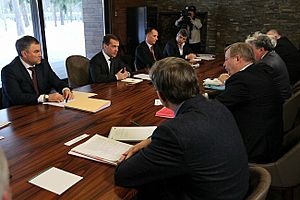
Nemtsov was one of 34 people who signed an online statement against Putin called "Putin must go." It was published on 10 March 2010. Six months later, in September 2010, Nemtsov and others formed the "For Russia without Lawlessness and Corruption" party. This party later became the People's Freedom Party. In May 2011, the party tried to register with the government but was denied.
In December 2010, Putin said on TV that Nemtsov and others had "dragged a lot of billions" in the 1990s and were now "pulled away from the manger." He suggested they wanted to "go back and fill their pockets." In January 2011, Nemtsov and his colleagues sued Putin over this statement, but the court dismissed the case. The judge said the names were used as general terms for a type of politician.
In May 2013, Nemtsov wrote a report saying that up to $30 billion had been stolen from money set aside for the Sochi Olympics. He accused Putin's government of favoritism and stealing money on such a large scale that it threatened Russia's safety. He suggested creating a group of citizens to investigate these issues.
Arrests and Activism
Protests and Imprisonment
Nemtsov was arrested on 25 November 2007 during a protest against President Putin. He and other opposition figures often complained about being bothered by officials. Police had often broken up protests, which were called Dissenters' Marches. Nemtsov was released later that day.
On 31 December 2010, he was arrested again with other opposition leaders during a rally. This protest was against government limits on public demonstrations. He was sentenced on 2 January 2011 to 15 days in jail. Important figures from other countries and Amnesty International spoke out against his arrest. Amnesty International called him a prisoner of conscience, meaning someone jailed for their beliefs.
In a February 2011 interview, Nemtsov described his jail cell as a "stone dungeon" that was dark and had no bed. He said his glasses, belt, and shoelaces were taken away. He believed his arrest was a political decision. Nemtsov filed a complaint with the European Court of Human Rights, which agreed to look into his case quickly.
During protests in Moscow on 6 December 2011, Nemtsov was arrested again with many other demonstrators.
Political Views
After he left the government, Nemtsov became an important voice in Russian politics. He was a key figure in the opposition to Putin's government. His political ideas led some to call him a "new liberal."
In February 2011, Nemtsov said that "everyone is unhappy with Putin, except perhaps his closest friends." He pointed out that a lot of money was leaving the country. He believed that even within Putin's own party, not many people wanted to follow him to the very end.
Nemtsov told Newsweek in September 2011 that Putin's decision to run for president again was expected. But he was shocked by how openly Putin and Medvedev announced their plan to switch roles, even before elections. Nemtsov said Russians had no choice but to accept this, calling it a "sickly humiliating" takeover of power. He also said that all his "friends in big business" planned to move their money out of Russia, and some even planned to leave the country.
In a March 2012 article, Nemtsov and Garry Kasparov supported ending a law that made trade difficult between America and Russia. They said that after the elections in March 2012, they and their friends publicly stated that Mr. Putin was not the true leader of Russia. They wanted the U.S. and other countries to stop treating Putin as a democratic leader. They asked the U.S. to replace the old trade law with a new one that would help relations between the U.S. and the Russian people, while not helping Putin's government.
Nemtsov was one of the few Russian leaders who openly spoke against Russia taking over Crimea. He believed that Crimea was part of Ukraine and that Russia's actions were against the law. He said that the people of Crimea, not Russian lawmakers, should decide which country they wanted to live in.
In an article in September 2014, Nemtsov sadly spoke about the "war between brothers" between Russia and Ukraine. He accused Putin of trying to divide Ukraine and create a puppet state in eastern Ukraine. Nemtsov wrote that Russia itself was "sinking into lies, violence, darkness, and imperial madness." He sometimes thought Putin was not thinking clearly, but other times he saw that Putin's main goal was to keep his own power and money at any cost. Ukraine had removed a corrupt president, and Putin needed to punish it to make sure no Russian would get similar ideas.
In April 2014, Nemtsov called Putin a "mental patient" in an interview. This statement led to a legal case against Nemtsov, but it was later changed to a minor offense.
Memorial Rallies
On 1 March, the day Nemtsov had planned to lead a protest, a memorial rally was held in Moscow. People carried signs that said, "He was fighting for a free Russia," and "He died for the future of Russia." Thousands of people also marched in St. Petersburg.
In August 2015, Nemtsov's daughter Zhanna Nemtsova received Poland's Democracy Award for her father's work. On 9 October 2015, on what would have been his 56th birthday, activists in Moscow put up a monument at Nemtsov's grave. The monument shows Nemtsov's name with five bullet holes in it.
Honors and Awards
- Medal of the Order "For Merit to the Fatherland", Second class (1995) – for his work in privatizing state property.
- Medal "For Strengthening of Brotherhood in Arms" (2001).
- Order of Holy Prince Daniel of Moscow (ROC) (1996) – for his help in building the nation.
- Honorary sign of the Legislative Assembly of Nizhny Novgorod Region "Merit" (2009).
- Order of Prince Yaroslav the Wise, Fifth class, (Ukraine) (2006) – for helping international cooperation and improving Ukraine's image.
- Order of Liberty (Ukraine, given after his death).
- Jan Karski Eagle Prize (Poland, 2015, given after his death).
- IRI Freedom Award (United States, 2015, given after his death).
Political Publications
Memoirs
- Provincial – 1997
- Provincial in Moscow – 1999
- Confessions of a rebel – 2007
Reports Criticizing the Government
Starting in 2008, Nemtsov and Vladimir Milov published several reports. These reports criticized Putin's government and suggested other ways for Russia to develop:
- Putin. Results – February 2008
- Putin and Gazprom – September 2008
- Putin and the Crisis – February 2009
- Sochi and the Olympics – April 2009
- Putin. Results. 10 years – June 2010, an updated version of the 2008 report.
- Putin. Corruption – March 2011. This report, also called "Putin the Thief," said that Putin's time in power had seen a huge increase in corruption. It described Putin's corruption in detail and said it was much worse than before. The report stated that corruption in Russia had become a system and made up 25% of the country's total income.
- In a May 2013 report, Nemtsov said that up to $30 billion had been stolen from money meant for the Sochi Olympics. He accused Putin's government of favoritism and stealing money. He believed this was a threat to Russia's safety. He suggested creating a group of citizens to investigate these crimes.
- At the time of his death, Nemtsov was preparing a report to prove that Russian soldiers were in eastern Ukraine. This report was published in May 2015 under the title "Putin. War." It said that over 200 Russian soldiers were operating in Ukraine.
Documentary Films
- 2015 – My Friend Boris Nemtsov (Russian: Мой друг Борис Немцов), a film about Nemtsov as a person and activist.
- 2016 – Nemtsov (Russian: Немцов), a film by Vladimir V. Kara-Murza.
- 2016 – The Man Who Was Too Free (Russian: Слишком свободный человек), a film by Mikhail Fishman and Vera Krichevskaya.
Images for kids
-
Barack Obama and Russian political leaders, including Boris Nemtsov
See also
 In Spanish: Borís Nemtsov para niños
In Spanish: Borís Nemtsov para niños
 | Kyle Baker |
 | Joseph Yoakum |
 | Laura Wheeler Waring |
 | Henry Ossawa Tanner |


